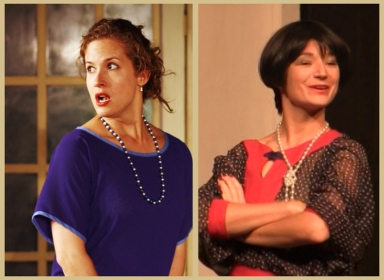‘Vive l’amour! . . . Vive le mariage!’
Translated and adapted by David Nicholson ©
from Divorçons by Victorien Sardou & Émile de Najac, 1880
[4 women; 4 men, with doubling]
♦ For a free copy of the script or to ask about rights, contact:
davidnicholson.comedies@gmail.com
Victorien Sardou’s comic masterpiece Divorçons was a hit from its first performance at the Théâtre du Palais-Royal, Paris on December 6, 1880, filling the theatre for an unprecedented full year run. Even George Bernard Shaw, otherwise unimpressed by French theatre, found it “irresistibly amusing.”
The multi-talented Victorien Sardou (1831-1908) was the most successful playwright of his age, writing comedies, tragedies and historical dramas. He wrote many of the latter expressly for Sarah Bernhardt, including Tosca (on which the opera was based) and Fédora (for which the hat was named).
The story in a nutshell:
In a setting of upcoming Divorce Act amendments, Henri Des Prunelles suspects that his young wife Cyprienne has been flirting – and perhaps more – with his cousin Adhémar. When confronted, Cyprienne justifies her actions as those of a young wife married to an older man – unlike him, she hasn’t tasted the best of life yet and prefers the excitement of exotic spices over the regularity of wheat germ. A crafty Henri turns the situation around by agreeing to a divorce, whereupon the young cousin assumes the new, boring status of husband-to-be and Henri takes on the allure of contraband. The only way Henri can convince Cyprienne he doesn’t have a lover himself, is to invite her to a romantic “divorce dinner” at his old bachelor bistro. Champagne, laughter, fine food and making sport of Adhémar rekindle their love and save their marriage.
I have adapted the play to 1921, a time when such portrayals would have become acceptable, although still daring, to English-speaking audiences. Social and political relations between the sexes and between the classes were rapidly changing in the wake of the Great War; fashions and technology began to more closely resemble the modern world.

Cyprienne was a hit with west-end Toronto audiences, and an award-winning production in Cape Town SA, where one reviewer called it a: “delightful and classy comedy . . . the fusion of sophistication, high carat sparkle and authentic style . . . testimony to two talented writers.”
It also had a staged reading in Costa Rica, and one of Cyprienne’s monologues was presented in a 2015 NYC festival as Madagascar Spices. (Monologues are available royalty-free for auditions and similar purposes. Contact me.)
For more production photos, click HERE.
Excerpt from ACT I
HENRI It seems I have no idea what you need. I’ve done the best I can . . .
CYPRIENNE (half sits up, then slumps back down in the chair) You’ve done . . . oh, mamma!
HENRI (going over to her) Do you want me to dress up as a Sicilian bandit and climb in the window?
CYPRIENNE Of course not. That’s the kind of thing men only do for their mistresses, in their youth – I imagine you’re past that now!
HENRI I can’t remember ever doing anything of the sort.
CYPRIENNE (moving left) Ah . . . passion, adventure, romance . . . what a life you’ve led!
HENRI (modest, but wary) Oh well, now . . .
CYPRIENNE But all I know about that world is what I’ve heard . . .
HENRI And I, for one, am happy about that!
CYPRIENNE . . . thanks to the brotherhood of men – who hold us down as girls, grind us down as women and simply ignore us when we let our hair go white.
HENRI On behalf of the brothers – what would you have us do?
CYPRIENNE If a girl could live life – really live it, just as a boy can, instead of being locked up . . . When she has experienced what the world has to offer, she could settle down into marriage – just like you did. She wouldn’t burn with curiosity and resentment – and her husband would have a virtuous, faithful wife.
HENRI Where do you get these ideas?
